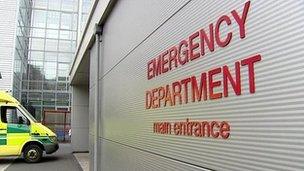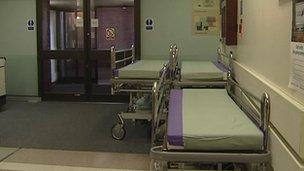Edwin Poots to detail plans to tackle problems at Royal A&E
- Published

Belfast's Royal Victoria Hospital is now the main hub of emergency care in the city
The health minister is due to announce on Wednesday how he intends to tackle the ongoing problems at the Royal Victoria Hospital's A&E department.
It emerged last week that a 77-year-old man died on a hospital trolley after waiting almost 24-hours for a bed.
His death triggered a full investigation by the Belfast Health Trust.
The problem has been escalating since the closure of the A&E department at the City Hospital in Belfast last year.
Edwin Poots, is expected to spell out how he intends to tackle the issue.
Health professionals are warning that the plan needs to address the short-term and not the long-term problem.
Dr George O'Neill, a GP in north and west Belfast, appealed for a broad consultation with health workers at all levels.
"I want to hear that the minister is willing to come up with solutions that are innovative, that are risk taking," he told Good Morning Ulster on Wednesday.
"For example, he should make it absolutely clear that the decisions should be made at the coal face. It should be driven from the bottom up.
"More power to health professionals who deliver at the coal face. That's doctors, nurses, allied health professionals, social workers.
"They are the people who know the system, they are the people who understand what the needs are. They are the people who will tell you whether what the people at the top decide will work or not."
On Tuesday, the director of the Royal College of Nursing said the strain on the A&E department at the RVH was preventing staff from delivering proper care.
Janice Smyth said nurses were under intense pressure and struggling to perform.
Belfast City Hospital's A&E unit closed last November.
Sinn Fein MLA Sue Ramsey said there was a perception that the move had put additional pressures on the Royal.
According to management at the time, the move was temporary and unavoidable due to the shortage of senior medical staff.
But it meant the Royal Victoria Hospital's A&E department has become the main hub of emergency care in Belfast.
Ms Smyth said nurses were "absolutely unable to give patients the care that they know that they need".
She added: "We are talking about human beings, we are not talking about factory production lines, we are not talking about retail trades.
"It is the Royal College of Nursing's view that whatever we do with services they must be focussed and structured on the patient."
However, the chair of the health committee, Ms Ramsey, said she had been told by the Belfast trust that the closure of the City's casualty unit had not put additional pressures on the Royal.

The Royal College of Nursing is concerned about the situation at the RVH
Ms Ramsey said the Belfast trust told her there had been "unprecedented" visits to the Royal's casualty department.
But she said the trust insisted this "wasn't due to the impact" of the City's unit closing.
Last October, a trade union representative from Belfast City Hospital told the BBC that closing the south Belfast department could have disastrous consequences.
The RVH had anticipated that it would have to deal with an extra 30,000 patients a year.
- Published21 March 2012
- Published20 March 2012
- Published16 March 2012
- Published15 March 2012
- Published15 March 2012